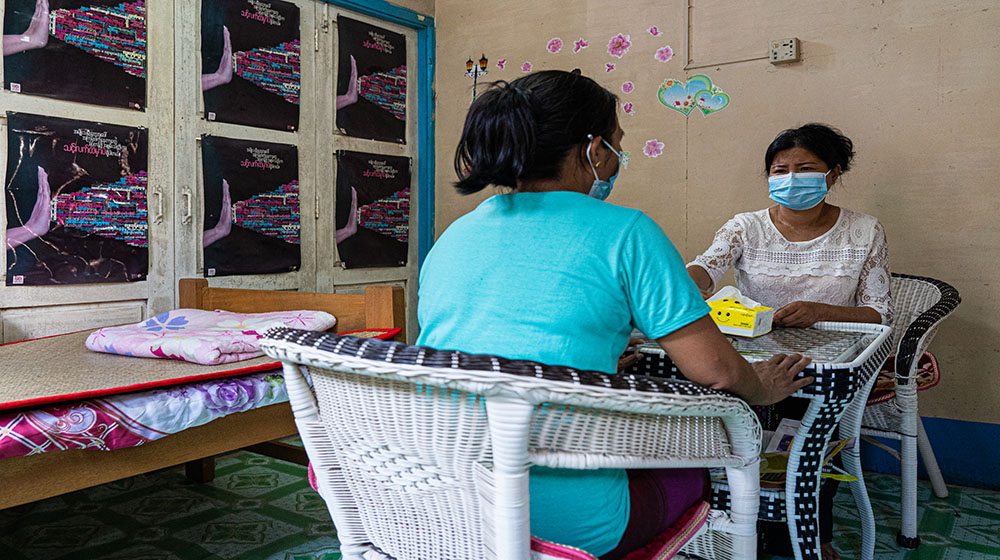"In the shadows of the conflict, we live with fear. It's not just the violence outside that terrifies us; it's the violence that finds its way into our homes, making us feel trapped in a cycle of fear and helplessness," said by Htoi*, a displaced woman whose life has been irrevocably changed by the ongoing conflict in Kachin State, Myanmar. "For women and girls here, the danger isn't only present during the crossfire; it's the gender-based violence that looms over our every step, and the struggle to find a safe place."
In 2024, 1.6 million women and girls out of 12.2 million are in need of protection assistance across the country according to an OCHA report. In Kachin, UNFPA has been supporting Metta through the Women and Girls First (WGF) programme since 2016. With the support from the government of France, UNFPA together with UN Women, has further strengthened its work in the conflict affected areas in Kachin. With the support of UNFPA, its Gender-Based Violence (GBV) partners in close collaboration with the local CSO partners respond to the emergency needs of GBV survivors and those at risk of GBV through access to lifesaving services and amplifying their voices to promote GBV awareness and responses in humanitarian contexts.
Seng Hkam, Project Coordinator of Metta in Kachin State, reflects on the critical nature of their mission: "In an environment where women and girls are in constant danger, our work is not only urgent but also vital."
The ongoing conflict in the country, including Kachin, presents significant hurdles in reaching people in need - there are for instance access challenges, movement restrictions, and safety and security concerns of staff and partners involved in humanitarian efforts. Despite these risks, activities need to be continued as there is an urgent need to support the countless women and girls affected by the conflict. UNFPA and partner organizations work together, constantly identifying innovative ways to ensure the delivery of lifesaving services including GBV and mental health and psychosocial support (MHPSS) services amidst these challenges.
"As a local organization working on the ground, we face challenges every day. But we strive to find solutions in collaboration with partner CSOs to overcome them. That is why it is very important to strengthen the capacity building of civil society organizations and women led organizations to continue providing quality GBV response services to women and girls in this affected region amidst the conflicts,” Seng Hkam said.

One crucial aspect of the work is strengthening coordination among local networks. which serve as vital mechanisms for connecting with the affected population and service providers amidst the volatile situation. San* from a local Women Association working in hard-to-reach conflict affected areas in Kachin said, “Through our coordination with local women and men groups and networks, we strengthen referral pathways for survivors of GBV to access lifesaving services. Based on our experience, innovative strategies, such as utilizing trained local volunteers for GBV awareness raising, are essential for effectively reaching out to the population in need. Thanks to these approaches, we maximize impact and ensure that support reaches those who need it most.”
UNFPA is working closely with GBV partner organizations and providing technical support to establish referral pathways for the GBV survivors. This survivor-centered approach prioritizes safety and well-being of the survivors providing essential services such as – medical services, mental health and psychosocial support services and other protection services through coordinated efforts. This ensures survivors receive timely, and effective support throughout their recovery, empowering them to rebuild their lives.
The profound impact of these efforts resonates through the stories of the women and girls who have sought support at the Women & Girls Centers in Kachin. "Coming here felt like stepping into a haven where my voice is heard and my pain is acknowledged," Htoi* said, her message underscoring the power of the support she received. She added, "I feel safe and empowered."
In 2023, UNFPA reached the lives of 776,000 individuals across the country, including over 400,000 women and girls who benefitted from programmes ensuring their access to critical health and protection services. The importanceof such programs is highlighted by the escalating needs in conflict-affected regions like Kachin, where the ongoing conflict amplifies the vulnerabilities faced by women and girls. As evidenced in the past three years, armed conflict exacerbates the risks of GBV, making GBV prevention and response services more crucial than ever.
Seng Hkam said, "Funding is also a key challenge for our local organizations for the continuation of critical GBV and MHPSS services for the affected population. Thanks to the support from the government of France, UNFPA, and other donors, we can continue delivery of services for the population in need. This is the time we need to stand together to call for international communities to invest in women and girls, vulnerable populations affected by the conflicts in Myanmar."
"Our efforts go beyond providing support and protection; it is about empowering women and girls and building resilience to stand firmly against gender-based violence in our communities," Seng Hkam added.




